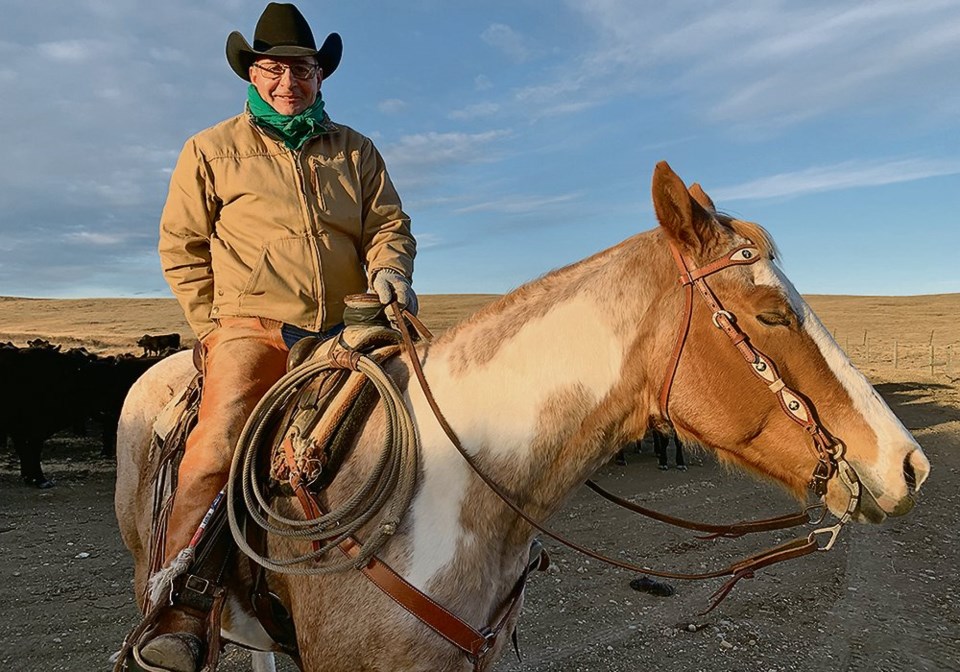WESTERN PRODUCER — Reg Schellenberg took a bittersweet flight home from Ottawa after he was named president of the Canadian Cattlemen’s Association.
The pride he felt to be representing the CCA at the highest level was tempered by the death of his father-in-law and well-known Saskatchewan cattle producer, Ted Perrin, who died March 25 in Swift Current.
“It knocked the wind right out of it,” Schellenberg said of his election.
“But like Shannon (his wife) said, if Ted would have known that I was going to have an opportunity to be elected as CCA president, that would have been something he was very pleased with.”
Schellenberg, who ranches with Shannon, their son Coy and his wife, Lauralie, and family near Beechy, Sask., has been a CCA director for Saskatchewan since 2010 and before that served on the Saskatchewan Stock Growers Association executive.
He said one of his top priorities for the 90th year of CCA is steering the industry through the aftermath of a challenging 2021. The drought through the entire West, along with the fires and floods in British Columbia, have put pressure on the entire sector.
“I think going forward one thing we at CCA have discussed, and we’ll be wanting to collaborate with our provincial organizations, is water infrastructure programming and maybe even some tweaks or some exemptions that would allow producers other options that would qualify for government support,” he said.
For example, he said producers who have a spring-fed water source should be able to pump water to a new or existing dugout to ensure cattle have access to better grass. He said governments must understand the severity of this drought and create options for producers.
“It’s not over right now,” Schellenberg said. “We’re cautiously optimistic going into 2022, we always want to be, but the reality is even right here at our ranch at Beechy we had pretty good snow cover but very, very little runoff.”
Dugouts and other water sources won’t recharge, he said, and that’s a concern for this spring and summer.
Schellenberg said livestock price insurance has to become a national program and the premium has to be cost-shared by provincial and federal governments.
Cattle producers foot the entire bill upfront for their insurance purchases, unlike crop insurance.
“Currently, producers that have access to livestock price insurance can, in fact, select pretty good coverage but it’s going to cost you about $50 a calf. Producers are saying that’s another $50 that they have to come up with up front in order to select their coverage.”
When price insurance was established in the wake of BSE there were concerns about countervail if premiums were cost-shared but Schellenberg said the American programs are so superior to what is offered in Canada that it isn’t a concern anymore.
Schellenberg said CCA will continue to advocate for a national foot-and-mouth disease vaccine bank. The United States allows Canada some access to its vaccine storage but he said Canada should have its own.
“The economic impact, if it ever broke out, would be estimated to be $60 billion plus on the Canadian economy,” he said. “Hopefully we’ve learned something through COVID in terms of preparedness for disease and vaccinations and I would hope our federal government would keep that in mind when we ask them for serious support.”
On trade, Schellenberg said Canadian beef producers want changes to the agreement with the United Kingdom.
“It’s been very beneficial to them but definitely no benefits to Canadian producers,” he said.
One of the hurdles is shipping cull cow beef to the U.K., where there are concerns about implants and growth promotants.
Schellenberg said the British don’t realize that cull cows have never received these substances because they go straight to the packing plant when they reach the end of their productive life.
He said it would be useful if a third-party audit, such as Verified Beef Production Plus, were recognized as a quality assurance guarantee.
Sustainability and recognition for carbon sequestration continue to be on the agenda as well.
Meanwhile, at the recent AGM, a motion to change the name of the CCA to Cattle Canada, but maintain the acronym, was discussed. Schellenberg said legal counsel is looking into what steps would need to be taken and the decision won’t be made until more information is available.
He said protecting, preserving and promoting the beef industry and securing its future for younger generations is of utmost importance.
“They’re coming into some very volatile times. There’s so many of us that are multi-generational family operations (and) we know it takes one generation to support the other generation. That’s the only way we can exist.”
For more content related to drought management visit The Dry Times, where you can find a collection of stories from our family of publications as well as links to external resources to support your decisions through these difficult times.

